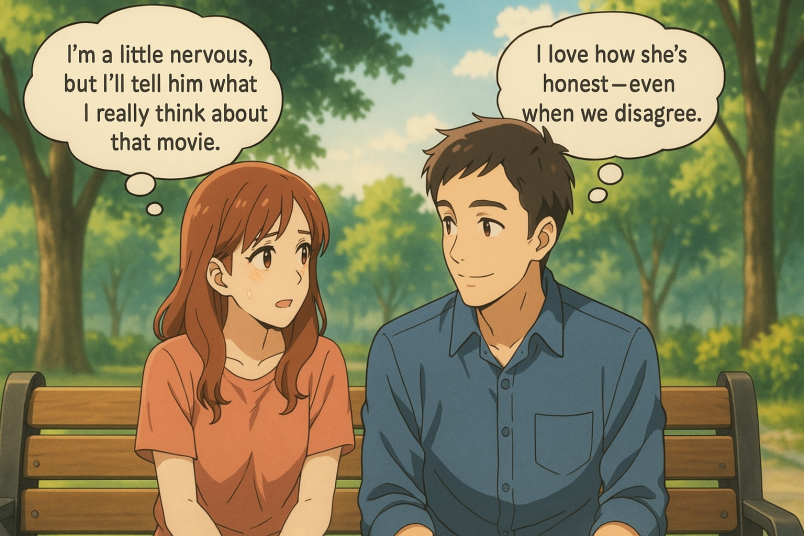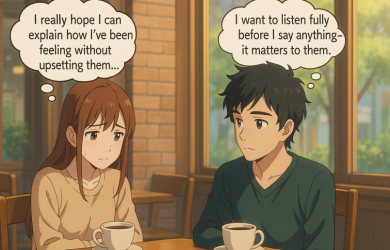How to Be Yourself in a Relationship: 11 Helpful Tips

Heal & Grow Daily for a Happier Relationship
Subscribe FREEKey Takeaways
Marriage.com AI Quick Summary
Sometimes it’s easy to forget who you are when you’re with someone you love. You start adjusting little things—your preferences, your routines—until you wonder if you’re still showing up as the real you. Being with a partner should feel like a safe space, not a stage where you’re performing.
After all, the right connection allows you to breathe, laugh, and be honest without fear of judgment. It’s not about perfection; it’s about feeling free to express your quirks, your dreams, and even your bad hair days.
If you’ve been wondering how to be yourself in a relationship, think of it as choosing self-respect and honesty over trying to fit an imagined mold… because that’s where true love thrives.
What does “being yourself” in a relationship really mean?
Being yourself in a relationship means showing up as the real, unfiltered version of you. It’s letting your partner see your genuine thoughts, feelings, and quirks without putting on a mask to please them.
You’re not hiding parts of yourself out of fear, nor are you trying to become someone you think they want. It’s about staying connected to your values, your voice, and your joy… while also being open to growth.
In simple terms, it’s loving and accepting who you are, and trusting your partner will do the same!
11 helpful tips to be yourself in a relationship
Staying true to yourself while sharing your life with someone can be tricky at times. Love can inspire us to grow, but it can also tempt us to blend in a little too much.
The good news?
You can protect your individuality and still build a strong, connected relationship. Below are 11 helpful tips to understand how to be yourself in a relationship, each offering a way to honor who you are while deepening the bond you share.
Think of them as small reminders that your authentic self is always worth showing up for.
1. Hang out with your friends
While you’re in a relationship, remember that your friends are still an integral part of your life. You should create time to bond with your friends and be open to meeting new people. Remember to set some boundaries when doing this because you’re in a relationship.
Adding new experiences with friends can also help you bring fresh energy into your relationship, give you more to share with your partner, and maintain a well-rounded social life outside of your romance.
Here’s how to communicate it with your partner:
- Let your partner know your plans in advance so they feel included, even if they’re not attending.
- Share highlights from your hangouts to keep them connected to that part of your life.
- Reassure them that spending time with friends doesn’t reduce your commitment to the relationship.
2. Engage in your hobbies
Doing your hobbies is another way to know how to be happy by yourself in a relationship.
According to Christiana Njoku, LPC
The moment you start to feel you are not interested in doing what makes you happy, even before you meet your partner, it’s a sign that you are losing yourself in that relationship.
Even though you and your partner may share the same interests, ensure you have time to engage in yours.
If you want to stay true to yourself, don’t put your hobbies away because they form your identity. When you keep practicing the things you love, you preserve an important part of your uniqueness, making you more confident, fulfilled, and even more attractive to your partner over time.
Here’s how to communicate it with your partner:
- Tell them why your hobby matters to you and how it enriches your life.
- Invite them to join you occasionally, but without pressure.
- Schedule hobby time in a way that still allows quality time together.
3. Set healthy boundaries
You need to create boundaries to learn how to be yourself in a relationship. You might be able to compromise sometimes, but it is okay to let your partner know that they have limits. Discuss what is acceptable and what is not.
Internationally acclaimed author Chany Rosengarten’s The Boundary Is You offers a simple, empowering approach to creating boundaries by embodying them, avoiding conflict and emotional strain.
Boundaries aren’t about pushing your partner away; they’re about protecting your emotional space so you can bring your best self into the relationship and ensure mutual respect and understanding in the long run.
Here’s how to communicate it with your partner:
- Use “I” statements to explain what you need without blaming them.
- Be clear about specific situations where a boundary applies.
- Revisit boundaries occasionally to ensure they’re still fair and relevant for both of you.
4. Be honest with yourself and your partner
It is important not to pretend with your partner because it helps you be yourself in a relationship. If you are not ready for something, let your partner know instead of agreeing to do it with them.
Honesty breeds trust, which becomes the foundation for a strong relationship, and it also helps you avoid unnecessary stress or resentment that might build up when you hide your true feelings.
Here’s how to communicate it with your partner:
- Speak up gently as soon as you feel uncomfortable with something.
- Share your thoughts clearly, without expecting your partner to “guess” how you feel.
- Be open to listening to their perspective after you’ve shared yours.
5. Don’t be afraid to say no
Many people find it hard to say no, even in relationships, because they feel their partner would be unhappy with them. While this may be true, saying no is one way to be yourself in a relationship.
It also lets your partner know that you have your beliefs, values, and preferences. Learning to say no without guilt shows self-respect, reinforces your boundaries, and encourages your partner to value and appreciate your authenticity even more deeply.
Here’s how to communicate it with your partner:
- Politely explain your reason for saying no so it feels considerate, not dismissive.
- Offer an alternative that works for both of you when possible.
- Stand firm without over-apologizing, which can weaken your message.
6. Have time for yourself
You may want to spend every minute with your partner, but it can get unhealthy sometimes. Creating time for yourself helps you learn how to be yourself in a relationship. It would help if you had time to reflect on your life, make new plans, etc.
Doing this allows you to remain true to yourself. Solo time also gives you the space to recharge emotionally, discover new passions, and return to your partner with a renewed sense of energy and connection.
Here’s how to communicate it with your partner:
- Frame alone time as something that benefits the relationship, not as a rejection.
- Let them know when and how you’ll spend that time.
- Encourage them to also take personal time for their own growth.
7. Be conscious about personal development
When it comes to being yourself in a relationship, you need to prioritize your personal development and ensure that you don’t remain stagnant in different aspects of your life.
A nine-month study of 287 couples found that decreases in relationship-specific interpretation bias were linked to reduced neuroticism, promoting intra- and interpersonal maturation. Results suggest romantic relationships promote emotional stability, highlighting cognitive processing changes as key mechanisms for personality development in newly enamored partners.
Growth could mean learning new skills, expanding your knowledge, or working on emotional maturity—all of which strengthen your confidence and help you contribute more meaningfully to the relationship over time.
Here’s how to communicate it with your partner:
- Share your personal goals and explain why they matter to you.
- Ask for their support or encouragement when it’s needed.
- Celebrate your progress together so they feel involved in your growth.
8. Don’t depend on your partner for everything
Even though partners might do things for each other, being true to yourself in a relationship may require sorting out things yourself.
Christiana Njoku highlights that:
As much as you can, learn to be independent and not depend on your partner for things you can do for yourself.
If your partner decides to help without being invited, you can consider giving them a chance.
Independence not only boosts your self-esteem but also allows the relationship to thrive without the burden of one person feeling over-relied upon, keeping the connection balanced and healthy.
Here’s how to communicate it with your partner:
- Let them know you appreciate their help but want to handle some things yourself.
- Reassure them that independence doesn’t mean emotional distance.
- Offer to switch roles sometimes so both of you can give and receive support equally.
9. Don’t let your insecurities weigh you down
If you had insecurities before meeting your partner, and you let them burden you, then you’re not being true to yourself. Remember that everyone has flaws and insecurities that they are dealing with.
Acknowledging and working on yours can free you from unnecessary emotional strain, help you grow stronger as an individual, and make your relationship a more supportive and uplifting space.
Here’s how to communicate it with your partner:
- Be honest about the insecurities you’re working on.
- Ask for their patience and understanding during moments of self-doubt.
- Accept reassurance when they offer it, rather than dismissing it.
10. Be ready to grow with your partner
When it comes to how to be secure with yourself in a relationship, you and your partner should be ready to grow together. It should not be a one-sided affair in which one person is progressing while the other is just an onlooker.
Research on couples found that nurturing, action-oriented support boosted relationship quality and self-improvement, while criticism and invalidation hindered both. Positive partners help predict greater growth, whereas negative support-seeking reduces it.
Shared growth keeps the relationship dynamic and exciting, encouraging both of you to inspire each other, celebrate wins together, and navigate challenges as a united team.
Here’s how to communicate it with your partner:
- Discuss your individual and shared goals openly.
- Celebrate milestones, no matter how small, to maintain motivation.
- Support each other during setbacks instead of placing blame.
11. Accept and express your true emotions
Being yourself means letting your real feelings—joy, sadness, frustration, or excitement—be seen and acknowledged. Bottling them up can create distance and misunderstandings.
Sharing openly builds trust, invites deeper conversations, and helps your partner truly understand you… while creating space for them to do the same. Over time, this emotional honesty strengthens your bond and makes the relationship feel safer. After all, love grows best where both people feel free to be real.
Here’s how to communicate it with your partner:
- Use gentle, clear language to share your emotions without blaming.
- Let them know what kind of support you need in that moment.
- Listen openly when they express their own feelings in return.
Watch this video in which Geoffrey Setiawan, a relationship & marriage consultant, shares how to be more expressive and vulnerable in a relationship:
Can you be yourself and still compromise?
Being authentic doesn’t mean digging your heels in or refusing to meet your partner halfway. It’s about knowing your values, expressing your needs clearly, and finding solutions that work for both of you.
Compromise becomes healthy when it’s mutual, respectful, and doesn’t require you to give up who you are. Sometimes, bending a little shows love and flexibility; other times, standing firm shows self-respect. The key is balance… and remembering you’re a team, not opponents.
Here’s how to make it work:
- Know your non-negotiables.
- Listen to their perspective fully.
- Offer options that meet both needs.
- Check in to ensure no one feels unheard.
When you compromise without losing yourself, your relationship grows stronger. It’s not about winning or losing—it’s about building a life where both voices truly matter.
FAQs
It’s natural to have questions about how authenticity works in love, especially when it comes to balancing your needs with your partner’s. These answers can help clear up common concerns and give you a little extra perspective.
-
Is it good to be yourself in a relationship?
Yes, it is good to be yourself in a relationship. When you stay true to yourself, you will be happier and find it easier to enjoy life by yourself and with your partner.
Trying to be someone else can backfire, as your partner would not know who you are and what you truly want.
-
Is it healthy to put your partner before yourself?
Like with everything else in life, balance is important when putting yourself over the needs of others. Sometimes, it may be advisable to compromise and let your partner have their way before you consider yourself.
-
Can you be yourself if your partner has different values?
Yes, but it requires open communication, respect, and understanding. You can maintain your core beliefs while finding ways to meet in the middle without losing your sense of self.
-
How do you know if you’re losing yourself in a relationship?
Signs may include giving up hobbies you once loved, neglecting friendships, or feeling like you can’t express your true opinions. Self-reflection can help you notice these changes early.
Authenticity is the real love language
At the end of the day, love should feel like a place where you can breathe and be your whole, authentic self. Learning how to be yourself in a relationship isn’t about perfection—it’s about honesty, self-respect, and connection.
You don’t need to shrink your personality or silence your needs to make someone happy. The right person will celebrate your individuality, not fear it.
So keep showing up as you, quirks and all… because when you’re true to yourself, you give your relationship the best possible chance to grow in trust, joy, and lasting love.
 Tips
Tips
Write your tip or submit a video tip
All tips are reviewed before the publishing.
Share this article on
Recent Articles
Related Quizzes
Heal & Grow Daily for a Happier, Healthier Relationship
Subscribe FREE on YouTube We'd love your feedback!
We'd love your feedback!
 Expert Q&A
Expert Q&A
Ask your question related to this topic & get the support you deserve from experts.





















 Thanks for your feedback!
Thanks for your feedback!